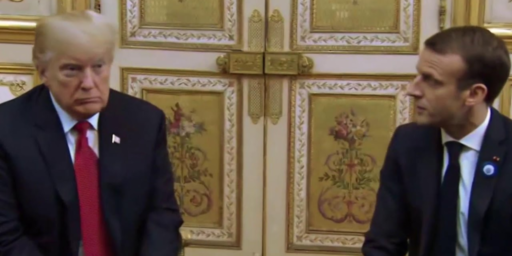Macron and Le Pen Advance To Runoff In French Presidential Election
French voters face a stark choice in the May 7th runoff for President. Hopefully, they'll make the correct choice.
When the smoke cleared after Sunday’s first round in the French Presidential election, the French people were left with a rather clear choice between the rather mainstream center-left politics of Emmanuel Macron and the right-wing politics of National Front leader Marine Le Pen in a runoff that is likely to have major implications for both France and the rest of Europe:
PARIS — In France’s most consequential election in recent history, voters on Sunday chose Emmanuel Macron and Marine Le Pen to go to a runoff to determine the next president, official returns showed. One is a political novice, the other a far-right firebrand — both outsiders, but with starkly different visions for the country.
The result was a full-throated rebuke of France’s traditional mainstream parties, setting the country on an uncertain path in an election that could also decide the future of the European Union.
It is the first time in the nearly 59-year history of France’s Fifth Republic that both of the final candidates are from outside the traditional left-right party structure. Together, they drew less than half the total votes cast in a highly fractured election.
Even before the official tallies were announced, the political establishment was rallying behind Mr. Macron, warning of the dangers of a victory by Ms. Le Pen’s far-right National Front, though few analysts give her much of a chance of winning the May 7 runoff.
Mr. Macron, a former investment banker, abandoned traditional parties a year ago to form his own movement with an eclectic blend of left and right policies. He campaigned on a pro-European Union platform, coupled with calls to overhaul the rules governing the French economy.
“The French people have decided to put me at the top in the first round of the vote,” Mr. Macron told jubilant supporters at a rally in Paris. “I’m aware of the honor and the responsibility that rest on my shoulders.
Ms. Le Pen’s success was a victory for people who oppose the European Union and for those who want to see more “France first” policies to restrict immigration, protect French industry and limit public signs of Muslim faith, including the wearing of head scarves.
“The great debate will finally take place,” Ms. Le Pen said on Twitter. “French citizens need to seize this historic opportunity.”
Political experts said the vote showed a new, profound cleavage in French politics around globalization, as well as France’s relationship with the European Union.
“Fundamentally, this shows that France is going through deep political tensions: clashes over the global economy, the integration of France into the global economy and into Europe,” said Bruno Cautrès, a political analyst and public opinion specialist at the Center for Political Research at Sciences Po, the institute of political studies in Paris.
It is not that the left-right divide no longer matters — after all, voters gave roughly 40 percent of the vote to various versions of the traditional left and right — but that it is now complicated by the crosscutting politics of globalization versus anti-globalization.
With 97 percent of the vote counted, Mr. Macron had 23.9 percent, Ms. Le Pen had 21.5 percent, the mainstream right candidate François Fillon had nearly 20 percent, and the far-left candidate Jean-Luc Mélenchon had 19.6 percent.
When Ms. Le Pen spoke to supporters in the small town of Hénin-Beaumont in northern France, although the results were not yet definitive, she sounded victorious.
She not only made it to the second round for the first time, but also got a higher percentage of votes than she did in 2012, and a higher percentage than her father, Jean-Marie Le Pen, did in 2002, when he made it to the second round as the National Front candidate and faced Jacques Chirac.
Ms. Le Pen said the outcome was “an act of French pride, that of a people who are raising up their heads, that of a people sure of their values and confident of the future.”
That future would be a perilous one under the National Front, others warned. Bernard Cazeneuve, the sitting Socialist prime minister, called Ms. Le Pen’s project “dangerous and sectarian” and said it would “impoverish, isolate and divide” the country.
“It will inevitably lead to the end of Europe and of the euro, and, eventually, to France’s relegation,” he said. “The National Front cannot be the future of our country.”
For now, voters narrowly embraced Mr. Macron’s centrist calls for change over more strident appeals from the far left and the far right for France to fortify itself against immigration and globalization.
His success also suggests that despite multiple terrorist attacks in France recently, a message of outreach to immigrants and acceptance of Muslims, as well as of ethnic diversity, has some currency. Ms. Le Pen campaigned stridently against Muslims and immigration, linking both to security threats, and she may have benefited from a final surge of support after a terrorist attack in Paris on Thursday.
In contrast, Mr. Macron, in his address to supporters as the returns were still being tabulated Sunday night, emphasized that he wanted to be the president of all of France. He promised “to bring together the French people,” clearly recognizing that if he wins the runoff, as is expected, he will have to lead a politically fractured country.
Four candidates with markedly different views came within a few points of one another in the vote on Sunday, suggesting that the fight about what vision of France will dominate the future is far from over.
Both Mr. Macron’s supporters and those of Ms. Le Pen were cheering madly at their respective candidates’ headquarters, with Ms. Le Pen’s loyalists dancing in the street outside the place where she was speaking in Hénin-Beaumont.
The two finalists could hardly be more different on the big questions facing France: globalization, immigration and French identity. Beyond that, they represent completely different faces of France.
Ms. Le Pen’s voters want a government that protects them from the vicissitudes of the marketplace and closes its borders to outsiders, re-establishing the frontiers that have been largely erased by the European Union.
Although Ms. Le Pen has younger, more high-tech voters, she also represents the France that feels left behind: the workers whose jobs have moved to cheaper countries, such as those in Eastern Europe and Asia.
She represents young people who have to go to work early in life to help support their families, and who do not have the advanced degrees that afford them a good income. And she represents people who feel threatened by the immigrants thronging to Europe.
“Marine will fight for the young people — for their future, for their freedom, for their job, for their family,” said Aurore Lahondes, a resident of the central-west city of Angers. She called Mr. Macron, a onetime investment banker at Rothschild & Company, “the candidate who is the most far away from the people.”
“He is the candidate of the financial part of the world,” Ms. Lahondes, 19, said in an interview at a bar that had been rented out by the local National Front federation. “He is the candidate of the European Union.”
Mr. Macron represents a more educated and cosmopolitan France. His voters are not all privileged by any means, but they believe that looking beyond the country’s borders will enrich them in every way, economically and culturally. Mr. Macron’s challenge will be to convince more of the French that globalism has as many rewards as it does costs.
“Globalism has positive effects, but it also increases precariousness and inequalities,” said Thomas Guénolé, a political-science professor at Sciences Po.
The vote on Sunday came after a bruising campaign in which the public repeatedly rejected candidates who were expected to be winners. In the mainstream right primary, the mayor of Bordeaux, Alain Juppé, was expected to handily best Mr. Fillon. Instead, Mr. Fillon trounced him.
The left suffered similar upheaval, with the expected winner of the Socialist primary, former Prime Minister Manuel Valls, losing to Benoît Hamon. Mr. Hamon floundered during the campaign and received less than 7 percent of the vote, a cratering of support for his party.
On the right, Mr. Fillon initially looked like a potential winner, but a nepotism scandal — in which he was accused of embezzling public funds by paying his wife and children to work as his assistants, although they appear to have done little work — defeated his efforts to make it to the second round.
“The obstacles put on my path were too numerous, too cruel,” he said, conceding defeat Sunday night.
In the meantime, Mr. Macron appears to have been in the right place at the right time, with mainstream candidates falling on either side and a far-right candidate whom many in France cannot imagine having represent the country.
That does not mean that people favor him, but rather that he was the “least worst” vote: an especially weak position for a candidate with no real party base behind him.
In several respects, this first round of the election broke several political molds for France, and that throws something of a monkey wrench into the process that makes the final outcome somewhat uncertain, although it still appears that the odds favor Emmanuel Macron in the runoff that takes place in less than two weeks on May 7th. First of all, as Adam Taylor notes in The Washington Post, French Presidential elections have usually ended up being a scenario when the first round results in a final runoff between the candidate of the major center-right coalition faces off against the candidate of the center-left coalition, and the final result in the second round is one where one side or the other ends up winning by a margin not unlike what we typically see in the popular vote here in the United States between the Republican and Democratic candidate. Under this scenario, the largest margin of victory in a French election was the 58% of the vote that Georges Pompidou received in the 1969 Presidential election. The one exception to these general rule prior to this year came in 2002 when Jacques Chirac ended up in a run-off against Jean-Marie Le Pen, Marine’s father and the founder of the National Front. Le Pen making it into the second round came as something of a shock to French politics that year, and it resulted in parties from both sides of the aisle uniting behind Chirac to give him a 64.4% margin of victory over Le Pen in a second round that saw Le Pen only slightly improve on the 16.88% of the vote that was sufficient to get him into the runoff in that election. Obviously, Macron and his supporters are hoping that they see similar results, if not the overwhelming and historic margin of victory that Chirac received, in the runoff election coming up on May 7th.
This year, Ms. Le Pen ended up doing substantially better than her father did in the first round in 2002, earning 21.43% of the vote according to the latest available counts, a number that was largely in line with polling heading into yesterday. Despite that, the woman who has been called the Donald Trump of France and who Trump himself spoke positively of in the days before yesterday’s election, faces an uphill battle arguably as steep as the one her father faced fifteen years ago:
Although vote counts are still being finalized, the first-round result should be a good one for pollsters, which correctly had Macron and Le Pen in the top two positions. In fact, the pre-election polls — which had shown Macron at 24 percent, Le Pen at 22 percent, the center-right François Fillon at 20 percent and the far-left-wing Jean-Luc Mélenchon at 19 percent — should come within a percentage point or two of the final result for each of the top four candidates.
The same polls show Macron in a dominant position in the runoff. He leads Le Pen by 26 percentage points in polls testing the two-way matchup, according to data compiled by G. Elliott Morris of The Crosstab.
And yet, observers of the race seem cautious about Macron’s chances. Betting markets give Le Pen a 13 percent chance — about 1 in 7. Ian Bremmer, a political scientist who runs The Eurasia Group, has given Le Pen a 40 percent chance, meanwhile. (Bremmer’s estimate wasn’t based on any sort of statistical model; he argues that the polls don’t reflect major elements of French politics.) And esteemed publications such as The Guardian are questioning whether the polls can be trusted at all, despite their accuracy on Sunday:
By contrast, polling-based models give Le Pen very little chance. Morris’s model, at The Crosstab, gives Le Pen a 3 percent chance of winning the runoff. And a model designed by The Economist puts Le Pen’s chances at less than 1 percent.
Notwithstanding the fact that pre-election polling ended up being largely in line with the first round results we saw yesterday, elections in several parts of the world have left many political analysts skeptical of relying on polling during what appears to be a particularly tumultuous time in politics in several parts of the world. Polls before the 2015 British General Election generally showed a far closer outcome between the Tories and Labour that the final result ended up showing, for example, and the same thing happened appeared to happen with respect to the Brexit vote last year, although the final result was largely consistent with the final numbers. Most recently, of course, Donald Trump surprised the world by winning the U.S. Presidency, albeit only due to the fact that the election was decided pursuant to the vote of the Electoral College rather than the total popular vote. In that case, though, it’s worth noting that the final national polls were largely consistent with where the popular vote ended up, the problem was that state-level polling in areas such as the upper Midwest didn’t pick up on the shift toward Trump in the final weeks of the campaign.
Given this history, there’s plenty of reason to be careful about predicting the outcome of elections based on the polls alone. However, as Nate Silver goes on to note in the piece already quoted above, the odds clearly seem to be against Le Pen doing much better than she has already done in the first round, which would obviously not be sufficient to win a one-on-one runoff against Macron:
in my view, the conventional wisdom espoused by analysts such as Bremmer is more likely to be way more out to lunch. Before the U.S. election, Trump trailed Hillary Clinton by only about 2 percentage points in the average swing state.1 In the Brexit vote, the “Remain” campaign’s lead was at least as narrow: about 2 points according to a simple average of polls, or just 0.5 percentage points according to a more complex averaging method. So while Trump’s victory and Brexit were historic events in world history, they were utterly routine occurrences from a polling standpoint; 2- or 3-point polling errors are extremely common.
But while there were plenty of precedents for a polling error large enough to elect Trump, there aren’t all that many examples of a 26-point polling error, which is what Le Pen would need. Pundits and other political observers often have poor intuition when it comes to translating polls into probabilities, leading them to treat narrow, fragile leads the same as double-digit ones. Ironically, the same type of sloppy thinking that led people to underestimate the chances for the Trump and Brexit victories may lead them to overestimate Le Pen’s odds.
As Silver goes on to note, the other top vote getters in yesterday’s election have already endorsed Macron and are urging their supporters to get behind him to defeat Le Pen in the runoff. This is the same thing that happened to her father, of course, and it led to a rebuke of the National Front that it didn’t fully recover from until the elder Le Pen was removed from party leadership by a coalition led by his own daughter. The reality, of course, is that while the younger Le Pen changed some of the rhetoric of her party, the substance didn’t change at all. It still represents the same anti-immigrant xenophobia it always has and Le Pen’s own statements, such as her efforts to downplay French collaboration in helping Nazis send Jewish citizens of Vichy France to concentration camps and her too numerous to count derisive comments toward even legal immigrants to France, make her in some ways an even more dangerous candidate than her father. Additionally, were she to win and have the Parliamentary support necessary to enact her platform, her policies would tear apart the European Union, which has on balance been good for Europe and good for France, and result in a France that will become more insular, poorer, and, ironically given the fact that many conservatives here in the United States were cheering her victory on Twitter last night, more socialist.
Based on available data, Macron should see a decisive victory in the second round. It’s still worth being cautious, of course, especially since it’s unclear whether Le Pen’s anti-European Union, anti-immigrant rhetoric will play better thanks to the fear of terrorism that has been stirred up by the wave of terror attacks that have hit France over the past couple of years. Hopefully, though, French voters will see this election for the stark choice that it represents and reject the xenophobia of Le Pen. If they do, then they’ll instantly prove there smarter than at least 63 million Americans.






I was baffled to see *some* so-called conservatives supporting Le Pen. She’s not conservative in any way shape or form. Her platform — which includes nationalizing banks — is way closer Melenchon than it is to anything resembling free-market conservatism. I hope she gets totally crushed in the election but don’t have high hopes.
@Hal_10000:
She’s anti-immigrant. That trumps–you should pardon the expression–everything else.
I don’t think she can win, too many French people hate her. Even more than Americans hate Trump.
“…[French voters]’ll instantly prove there (sic) smarter than at least 63 million Americans.”
That’s not really as high a bar to clear as it seems.